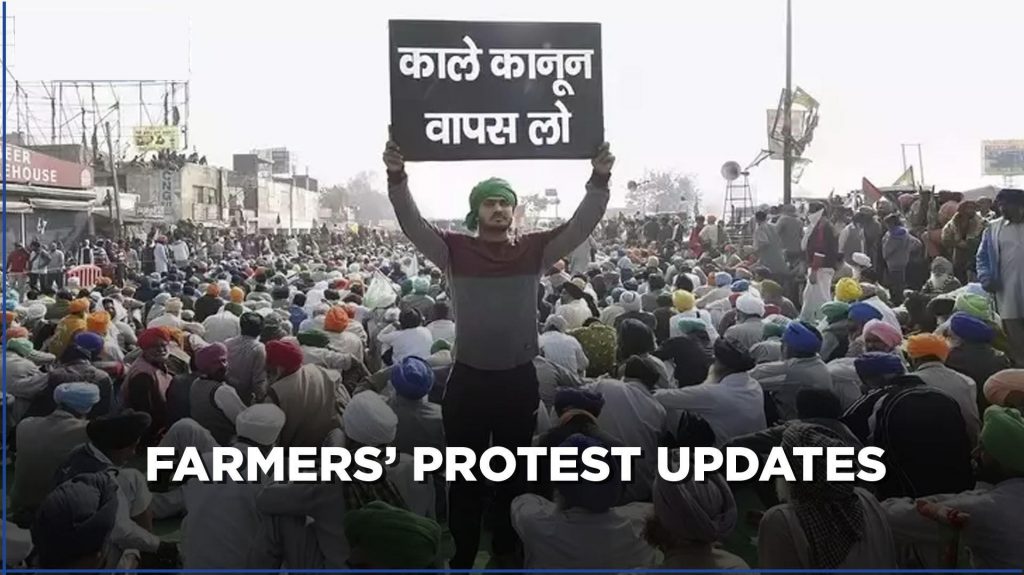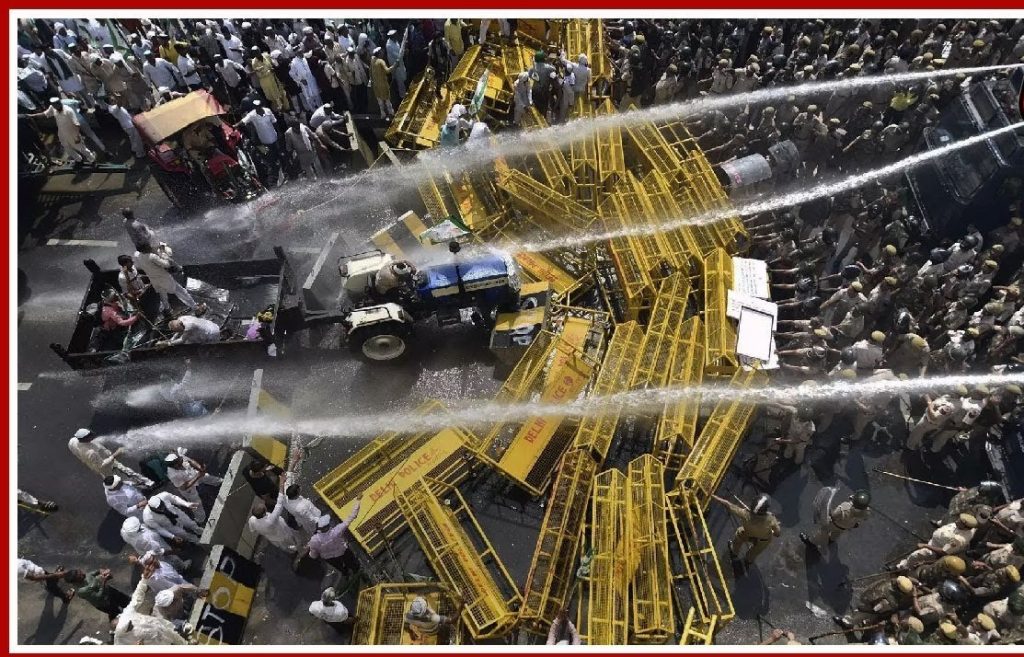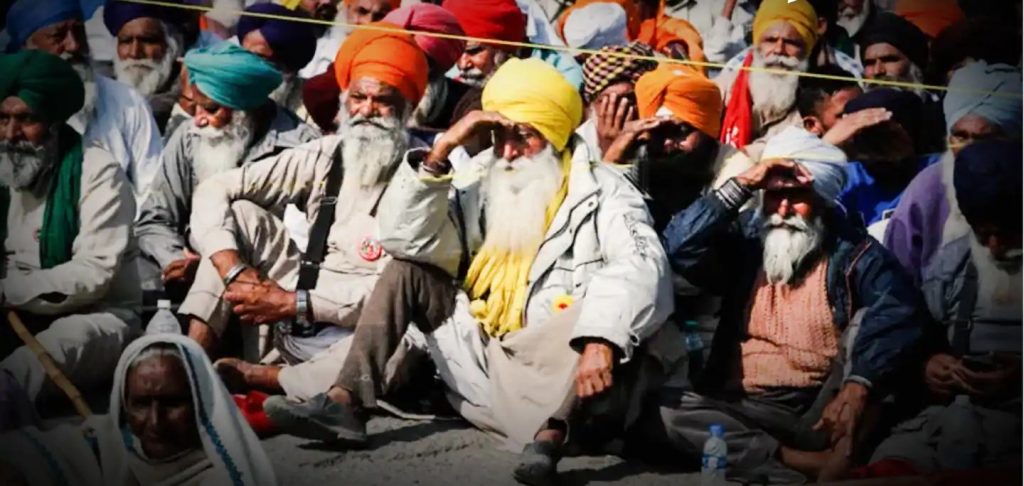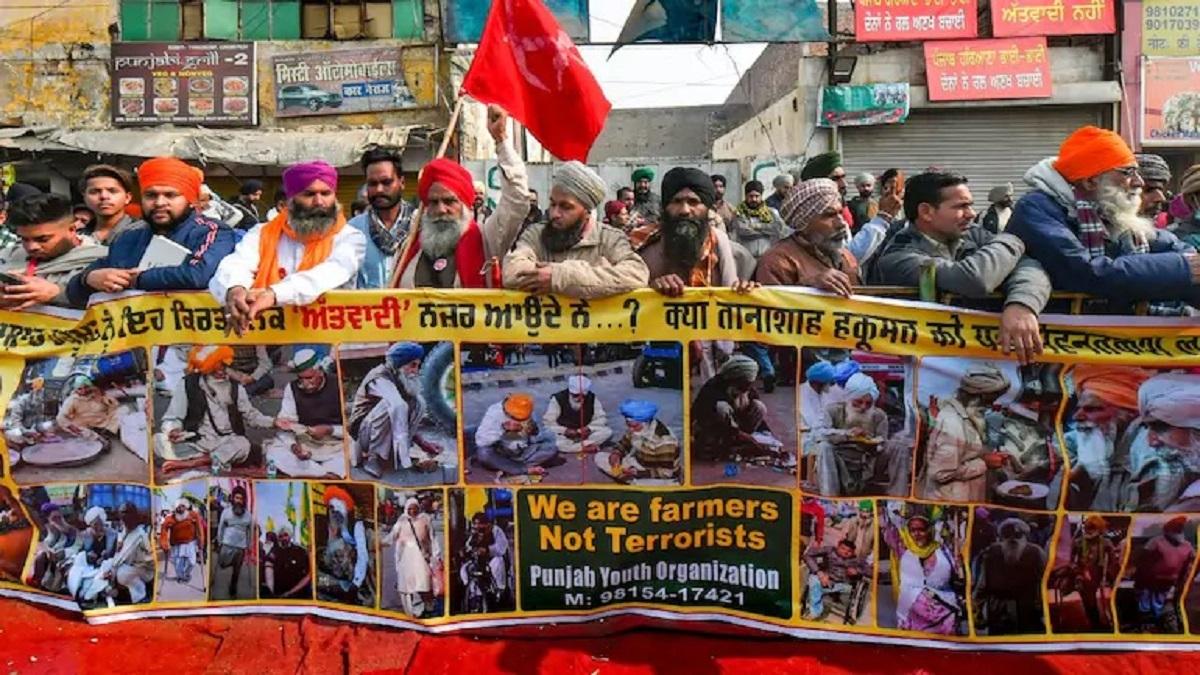By Sarabjeet Dhody Natesan
The morality of the farm struggle, of the dissent shown by the agricultural sector in India, is not about its 20% contribution to India’s GDP, or about providing work to about 50-65% of the population that works in agriculture, or about the negative terms of trade that it faces and still endures.
The morality of dissent comes from the forgotten contribution of the agricultural sector in nation-building.
It is simply about the staggering equality of status that it has conferred to the country on the world stage. Where it has enabled India to enter honorably, arenas of global power. Without a begging bowl to be filled up with food along with the pity, virtue, and sanctimonious platitudes of white philanthropy. The case of the shipments of PL-480 wheat from the USA, and the highhandedness of the American administration, should neither be forgotten nor consigned to textbooks of history.
The morality comes from feeding a billion mouths from the toil of the land. And helping create surplus food stocks to stave off hunger and starvation. And then having extra to send to those needier. It is about the world’s seventh-largest land-mass producing the second-largest quantity of food. No numbers are needed to explain the significance of this contribution.
This feat achieved in less than 60 years, a promise fulfilled and in a very matter-of-fact way, a task accomplished. When the herculean duty of nation-building was bequeathed on the agricultural sector, it was neither questioned nor ignored. The partition-torn refugees, settled in Punjab, Western Uttar Pradesh, Haryana, Rajasthan, and many other places, rebuild the nation and in the process, their own lives too. The surplus food allowed a fledgling nation to not worry about providing for the hungry and the poor masses, to not get caught in the geopolitical power struggles, and to not be held to ransom to them because of its requirement of food.
It allowed the young and fledgling nation to spend her precious foreign exchange on its defense needs, it allowed for an extended period of peace and prosperity because the adversaries could see the defense procurements pile up. And it allowed India not to worry about the gun versus food argument, she was able to provide both. It also meant that India could spend her precious foreign exchange on her exponentially increasing energy needs, on growth propelling imported industrial products essential to achieve the goals envisioned in the planning blueprints, on life-saving medical equipment and medicines. The corpus also accorded the seekers, her students, scientists, and intellectuals to study and to create knowledge in foreign institutes and universities with infrastructure that India could not afford to provide by then.
The marketable surplus the agricultural sector created was invisible and perhaps therefore never acknowledged. And that gives it the morality to dissent.
The morality of this dissent is also to do with the timing of the legislation, called the Black Farm Laws; the process initiated much earlier and finished rather surreptitiously.

The dismantling of the agricultural sector didn’t start with the framing of the three bills, it started with the dismantling of the Planning Commission. It was further pushed by stopping government-backed macro-level data collection post-2016. Planning requires data, and with no Planning Commission, there was no need for data. And what one does not know, one cannot analyze and question. And it is easier to push the assertion that the farm bills will double farmers’ income or India’s potential has been unlocked in the last six years. With no data available, this claim can neither be proved nor countered.
The Planning Commission was replaced by Niti Ayog, a think tank rather than a blueprint provider for nation-building. A think tank that perhaps suggested opening up of the farm sector for the next phase of growth. And enabled the three farm bills that are at the base of this agitation. The bills that invited opinions and suggestions, not from stakeholders engaged in the occupation of agriculture but took inputs only from those who want to profit from it.
The morality of the farm struggle derives its force from the way they were pushed through, first as ordinances and then as hastily passed bills, during a pandemic induced lockdown. This sudden legislation, processed and passed through in two days, aided and abetted by switching off Rajya Sabha mikes to even keep the feeble voice of the opposition out, is not going to help anyone. The opposition is like a toothless tiger, with no power to veto the government in any sphere. And therefore, all this points to the inability of the government to discuss the bills and listen to voices that oppose its dictum.
The morality of dissent against the three bills also comes from the people who have been attacked. Demonetization’s narrative worked because it was them against you, the ill-begotten money of the rich turned to ‘raddi’. A flawed tax structure, GST’s narrative worked because it was sold as anti-colonist; oddly a tax was celebrated in the Parliament, to highlight the breaking of the old yoke, only to be replaced by a new one. Anti-Farmers Protest is using the narrative of rich farmers, limiting the agitation to farmers from Punjab and Haryana, misled and misinformed, and adding the dreaded Khalistani word for good measure.
To call the agitators, anti-nationals, a demographic section that largely sends its sons to either the battlefields or to the agrarian field. To either protect us or feed us. To be called misled, to take their domain expertise away from them and to tell them what is best for them. The larger idea, however, is also to circle in or circle out all people who don’t matter; there are millions of farmers, all are not from Punjab and Haryana, there are millions of farmers who are not rich, there are millions more of farmers who are operating of holdings of less than 2 hectares, and there are millions of farmers who are smarter than the administration in understanding the ground realities of agriculture. And to the framers of this policy, farmers don’t matter. Their struggles don’t matter, the present conditions of agriculture don’t matter. The agrarian crisis that India is undergoing today is not of the making of its final stakeholders, the farmers-big and small. It needs reforms but these are tectonic shifts, to benefit the buyers, rather a few buyers who have been quietly arranging the logistics required to implement the new policies. The immorality of this thought propels the agitation forward.

The morality of dissent also comes from the underhand ways in which the corporate sector of India wants to profit from the agricultural sector.
Keep things simple, look at it through the lens of economics- in a purely competitive market where equilibrium prices are determined by the interactions of demand and supply, without a price floor, prices are subject to volatility. A large arrival sees prices crash and a low arrival sees them rise exponentially. Prices behave strangely, they tend to move up but very rarely move down. More so, if the goods whose prices go up are essentials because one cannot do without consuming them. Thus, we see people, buying petrol even as it touches almost Rs 100 per liter. The case of food is similar, it is required for sustenance and living. Whatever be the price, it will be bought. And the corporate wants to profit from that necessity of consumption, at the expense of both the producers (the farmers) and the consumers (us); on the back of its money power that it holds and its deep pockets.
The final burden of a price rise is eventually borne by the consumers and that of a revenue loss due to a price fall is borne by the producers. This is truer in the agricultural sector. In case of a bountiful harvest, the inability of farmers to move fresh and quickly decaying produce, from the place of production to the place of demand, due to many factors such as lack of transport, inability to pay for the transport, and lack of knowledge of where the produce can be moved. This is further hampered by missing publicly available climate-controlled warehouses that can be rented by farmers to store their produce till further arrangements can be made for its profitable sale. Very often, you see farmers dumping fresh vegetables on the roads. It is precisely for this reason, all the back-breaking work done yields them nothing and the additional cost of transportation to the mandis becomes an albatross hovering over them.
The morality of the protests arises from the nod given by the government for the investment of public money through bank credits and loans to the corporates to create the infrastructure required in the agricultural sector; the warehousing, transportation system, and bank credit. To allow the corporates to replace the middleman by becoming the new middleman.
The morality of dissent comes from the government not making these facilities available to the small and marginalized farmers to profit from their hard work, to store in times of excess, and to wait for better prices. The government should have enabled this logistics for the small and marginal farmers instead of making it easier for the corporates to move into the agricultural sector. It is the moral responsibility of the government to better the lives of the millions and not the bottom lines of the corporates. And therein, it imparts morality to the dissent.
The morality of dissent against the farm bills also comes from the legislation itself. The bills are not only going to hurt the small and marginal farmers only but in the long run, will hurt the consumers too. The bills will introduce corporate middlemen into the agricultural sector. When the agricultural produce arrives in the wholesale markets, the mandis, the corporates will buy. They will buy in bulk because there is no limit to the amount they can buy and stock. The new farm bill allows this. The corporates can conceivably control market prices operating in the mandis, they can trigger a panic in the market by refusing to buy, forcing market prices to fall.
They will buy and stock and sell it to the retail market at prices much higher than what they bought from the farmers. Conceivably, they can also create a situation of fear and panic by withholding supply from the retail markets. And eventually sell at prices even higher than what would prevail in the markets, otherwise. The consumers will then end up paying a higher price than what they would have paid otherwise.
Why, you ask again?
Because profit-maximizing is the bottom line of the corporate sector. It is answerable to the shareholders and not its stakeholders. It is for this reason that the government had to legislate the Corporate Social Responsibility Law. To force them to share a part of their profit with the society they profit from. But only after a profit is made. And buying low and selling high is the way to make a profit. However, unfortunately, the legal system skillfully creates many ways for the corporates to even avoid CSR requirements.
The morality of the farmers’ dissent comes from the duplicity involved in the introduction of avenues of growth that the farmers are ill-equipped to understand, much less navigate. The bills provide farmers to enter into contracts with the corporate sector. To increase their reach and unlock doors to unimaginable wealth and prosperity. What are these contracts and who will write them? Who will check them and who will enforce them? What will be the jurisdiction of these contracts? Who will contest them and who will award compensation in case of a breach? Who will compensate the farmer for the time required to chase the legal system? Who will then oversee payments of the awarded amounts? With one party in the know, and the other party ignorant of the loopholes, however tightly these contracts are drawn, there is a grave possibility of injustice being perpetrated on the weaker party. History is a mute witness to this.
Furthermore, India is a large country with varying weather patterns. Crop variations and diversity are expected, normal, and accommodated. This diversity of crops ensures that there is a year-round supply of cereals, vegetables, and fruits in the country. To accommodate this diversity, the corporates will then have to draw local area contracts. And multiple ones for the same crop with different stakeholders in different geographical areas. At different times.
At the very onset, this gives power to the party with the knowledge of rules and the law and huge resources at its disposal to hire and retain legal teams to write and maintain these contracts. Then there is a serious issue of the cost of the service. The cost of legal retainer-ship can then be passed on to the weaker party in some legal speak language, in a hidden clause. It is likely, that while the cost of the legal retainers will very carefully be pushed or shared with the weaker party, the expertise of these teams will stay with the stronger one. The farmers entering into contracts will then bear the cost of the legal fees without having recourse to the legal opinion in times of duress.
To accommodate local area requirements, the corporates will need to enter into multiple contracts of various dimensions. These are difficult to enforce and control. It can become messy and corporates don’t like a mess. Except in power circles. Corporate policy is normally uniform and makes no provisions for local area needs. Local area considerations are only kept for the strategy of sales and marketing. Local area advertising works but local area procurement won’t.
The contracts will enable the more powerful and informed party to enter into agreements that will benefit them. For example, they can access future weather patterns, cropping and sowing patterns, and procurement patterns worldwide, create maps of demand and supply and then move farm production to commodities that maximize their revenue and profits. The non-availability of such information will not benefit the farmers, they will not be able to negotiate better terms for themselves. And it will certainly harm the food security of the country.
The extensive informal and local nature of India’s agriculture poses additional issues. One may argue that not everyone has to enter into corporate contracts, it is entirely up to the farmers to do as they like. However, the problem lies in the reach of the corporate, their legal power, and the lack of options left to the ones who don’t enter into such contracts. With the dwindling presence of the government in the market space and its absence in creating price floors, the farmers who choose not to enter into contracts may find no buyers for their produce. The ability of the bigger players with their buying power to out-wait the selling power could lead to distress sales and loss of revenue for rich and poor farmers alike. The framers would then have to resort to distress sale.
What the Indian government will help create is a concentration of market power in the hands of a few sellers- much like the current situation in the telecom sector- very few sellers and a large number of buyers. The few sellers will have the ability to move prices based on a fuzzy and varying telecom policy. Eventually, this will see Indian consumers paying big phone and data bills. It is on the anvil but under wraps.
Here, in the agricultural sector, a large number of sellers will sell to a few buyers. Again, concentration of market power. And the buyers will dictate the buying prices, if you don’t want to sell, go somewhere else. But there are not too many buyers and the perishable nature of this commodity requires quick offloading. Hence, the sellers will have no option but to sell, at the prices the buyers are offering. The slow withdrawal of the government without the creation of a safety net of a price floor will harm the agricultural sector incalculably. With or without the minimum support price, the sector is going to be taken over by the corporate sector. This is what enables the moral fight of dissent.

The morality of dissent comes from the missing media, failing in its task to report facts and information truthfully and unambiguously. The Indian media unfortunately has capitulated totally to corporate power and resources. It will be fairer to say that the corporate sector has bought all major media and the voices coming out are all pro-government normally and pro farm bills lobby now. The news from the Delhi borders where large jathas of farmers have been camping for almost a month has been limited to ten seconds sound-bites on all major Indian television networks. The agitators are referring to the media as Godi media, sitting in the lap of the government and reporting news favourable to its owners and government and also inventing news as it suits their fancy.
Interestingly, the lacunae created by the missing media has been filled by social media, the local tv channels and their newscasters, the local papers, and by the courageous efforts of the farmers themselves who have started publishing a bi-weekly newspaper called The Trolley Times. The name derived from the trolleys that they have hitched on their tractors and traveled to the campsites, the holy grounds of their protests.The motto of this newspaper is “Judahgey, Ladahgey, Jeetagey” (We will Unite, We will Fight, We will Emerge Victorious). It imparts the major lesson that when no one carries your voice, carry it yourself. And don’t be scared to speak up. This newspaper gives us hope that a just society is a creation of its inhabitants and however much you push the human spirit down, eventually, it will find a way to rise. It is a great example for others to emulate, when you need to make your voice heard, carry it far, carry it wide and carry it high. And this amplifies the morality of dissent, if the known pillar of society, the media, created to safeguard the society from power circles fail, raise your voice high and loud.
The morality of the farmers’ dissent also comes from the long-term consequence of this policy change on the hunger problems of India and its impact on the Right to Food legislation enshrined in the Constitution. The procurement by the government from the agricultural mandis is used to stock the public distribution system, the ubiquitous ration shops where the poor and marginalized consumers buy subsidized wheat and rice. What is going to become of them and their consumption needs? With rising un-employment and falling wages, both nominal and inflation-adjusted real wages declining, consumption and the subsequent hunger will be a major cause of concern. The government has not thought through the impact of these bills on the ground level stakeholders, the ration card holding consumers. Their helplessness adds to the morality of the agitation.
Last but not least, the morality of the farm struggle comes from the courage, conviction, patience, and large hearts of the farmers who are camping in the borders surrounding Delhi. In the bitter winter cold, for over a month now. They are not restless. They are calm. They are willing to wait it out, their numbers are swelling and their principled protest is motivating others to join them. They came with their trolleys laden with food, rations, and other supplies. With their plentiful supplies being supplemented by more offerings by farmers from all over India, there is a proverbial cornucopia. And still, trucks are coming in from Punjab, Haryana, Maharashtra, and even as far as Kerala, carrying more food and supplies for the ones protesting at the Delhi borders. It has prompted Khalsa Aid to also pitch their tents and help out in providing humanitarian relief, blankets, waterproof tents, clean bathrooms, hot water, socks, shoes, woolen caps, sweaters, toiletries, etc.
The farmers are not limited to a religion or a state. They are from all over India and having been denied entry into Delhi, they have organically grown villages along the Delhi borders. They have started Gurudwaras, Kirtan-Sabhas, langars, libraries, tuition centers, laundries, medical centers, dispensaries. Their large-hearted culture of sharing is making sure to leave no one behind, now they are feeding the hungry children of the neighbourhood, the police and security pressed to contain them in, the visitors to their makeshift villages, and lastly themselves. No burden on anyone, no seeking of alms. Asking for their just rights.
The pride they take in keeping the protest peaceful is visible. Their resolve is commendable as is their formidable presence on the borders, waiting patiently for the government to accept their demands to repeal the three black laws. No fight, no violence, no hatred, and no anger.
In the end, morality always wins.
Disclaimer: The opinions expressed within this article are the personal opinions of the author. AlignIndia does not take any responsibility for the content of the article.
(Sarabjeet Dhody Natesan is a student of Economics and Policy and teaches at a Liberal Arts University in the South of India. She lives near her favourite seashore, in Chennai, with her family)


